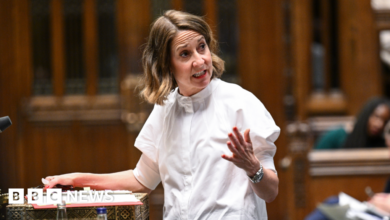GPs split over assisted dying plans, BBC research suggests

Health correspondent
Data journalist
 BBC
BBCFamily doctors in England are deeply divided on the issue of assisted dying, BBC research on plans to legalise the practice suggests.
The findings give a unique insight into how strongly many GPs feel about the proposed new law – and highlight how personal beliefs and experiences are shaping doctors’ views on the issue.
BBC News sent more than 5,000 GPs a questionnaire asking whether they agreed with changing the law to allow assisted dying for certain terminally ill people in England and Wales.
More than 1,000 GPs replied, with about 500 telling us they were against an assisted dying law and about 400 saying they were in favour.
Some of the 500 GPs who told us they were against the law change called the bill “appalling”, “highly dangerous”, and “cruel”. “We are doctors, not murderers,” one said.
Of the 400 who said they supported assisted dying, some described the bill as “long overdue” and “a basic human right”.
“We are keeping human bodies alive in the most inhumane manner,” one said. They asked: “How do we ethically justify forcing these bodies to continue to exist in decrepitude?”
We cannot know whether the GPs who responded to the BBC are representative of all family doctors.
It comes as MPs will this week again debate proposed changes to the controversial bill, with a vote in parliament expected on whether to pass or block it next month.
If assisted dying does become legal in England and Wales, it would be a historic change for society.
Current laws prevent medics from helping any patient to carry out their wish to die. The Terminally Ill Adults (End of Life) Bill would allow any doctor to be involved in assisted dying, but GPs are often a large part of the practice in other countries. On Tuesday, a separate bill to legalise assisted dying in Scotland passed an initial vote.
The BBC’s research, carried out over a few weeks in March and April, is the first in-depth look at how GPs in England feel about the proposed new law.
Nine out of 10 GPs who said they were against legalising assisted dying worried terminally ill patients would consider it because they felt guilty about being a burden on their loved ones or the health service.
“The right to die becomes a duty to die for those who feel a burden on family,” said one GP.
Another common concern was patients might be coerced. Some told us they had treated elderly people with family members they suspected of being more focussed on their inheritance than their relatives.
More than half of the group who opposed a law change said it would be against their religious beliefs.
They spoke about life being “sacred” and called assisted dying “sinful”. Some referred to the commandment “thou shalt not kill”.
Another argument from those who said they were against assisted dying was the health system should instead focus on improving end-of-life care.
One GP said creating an assisted dying law was “scandalous” when hospices were largely funded by charities rather than by the state.
Separately, on Tuesday the Royal College of Psychiatrists said that while the group “remains neutral” on the principle of assisted dying, it “just cannot support this bill”.
In an interview with BBC’s Newsnight, the college’s president Dr Lade Smith cited a lack of requirements concerning the “unmet needs” of patients, and a shortage of psychiatrists to process requests.
“We’re concerned that there isn’t a requirement to think about any unmet needs a person might have. A person with a terminal illness… they may be in pain, they have difficulty with their housing, their finances because they haven’t been able to work, they might feel lonely, isolated,” Dr Smith said.
Dr Gordon Macdonald, CEO of Care Not Killing said there was a “black hole” in the hospice budget and “we need better care not killing”.
Dying with dignity
More than 400 GPs told us they supported a law change, with some describing feeling “traumatised” and “haunted” by watching people die in “severe pain or distress”.
Of those who said they were in favour, more than nine in 10 respondents believed it could allow patients to have a dignified death.
Some shared personal experiences: telling us about watching their parents losing dignity or begging to die. One said their sick wife prayed every evening to not wake up in the morning.
Those who backed assisted dying often spoke about patient choice, arguing it was patronising not to let people decide how they wanted to die.
Wanting the option of an assisted death for themselves or their loved ones was another common reason for supporting the law.
“Personally, I would find this a comfort and I resent those who take this choice away from me,” one told us.
‘Unpredictable’ timeframe
If assisted dying does become law in England and Wales, it would apply to certain terminally ill patients who were reasonably expected to die within six months.
But more than a quarter of all the GPs who responded told us they would rarely, or never be confident assessing if a patient was expected to die in that time frame.
“It’s unpredictable even in the severely frail,” one said.
No doctor would be obliged to work in assisted dying. Of the 1,000 GP respondents, more than 500 told us they would be willing to discuss assisted dying with a patient.
Nearly 300 would assess if a patient was eligible and 161 said they would prepare a substance for a patient to take to end their own life.
Legal risks
Prof Kamila Hawthorne, chair of the Royal College of GPs, said the BBC’s research showed GPs had “real concerns about the practical and legal implications of a change in the law on assisted dying”.
“These must be acknowledged and addressed, so that any legislation is watertight,” she said.
Sarah Wootton, chief executive of Dignity in Dying, said GPs and other medics will “rightly be considering how they will navigate” the proposed law.
She said evidence from assisted dying laws in Australia and the US showed it could be carried out “safely and effectively, with far reaching benefits for end-of-life care and robust protections for both patients and doctors”.
Additional reporting by Vicki Loader, Elena Bailey, Natalie Wright and Hannah Karpel

Get our flagship newsletter with all the headlines you need to start the day. Sign up here.





